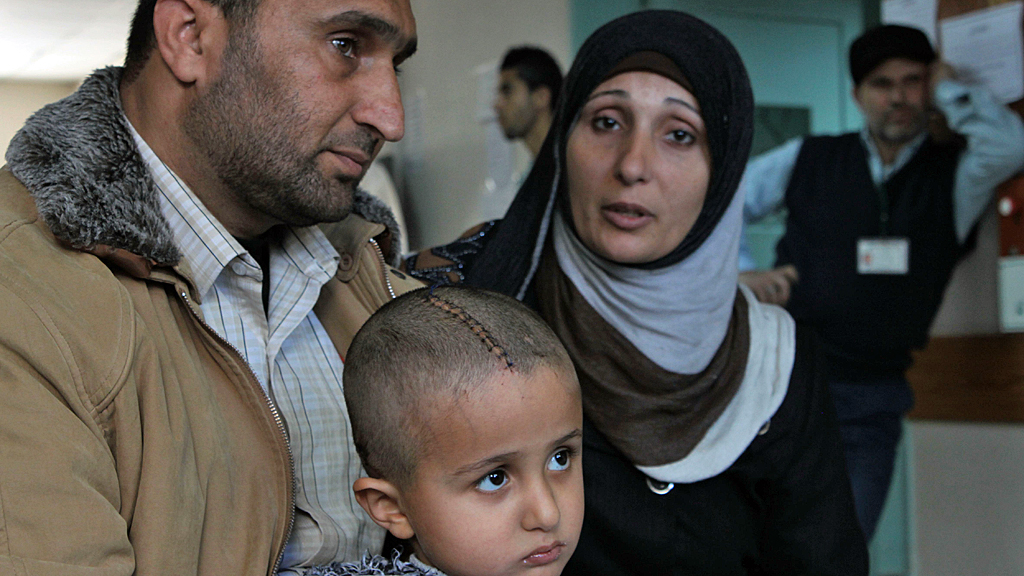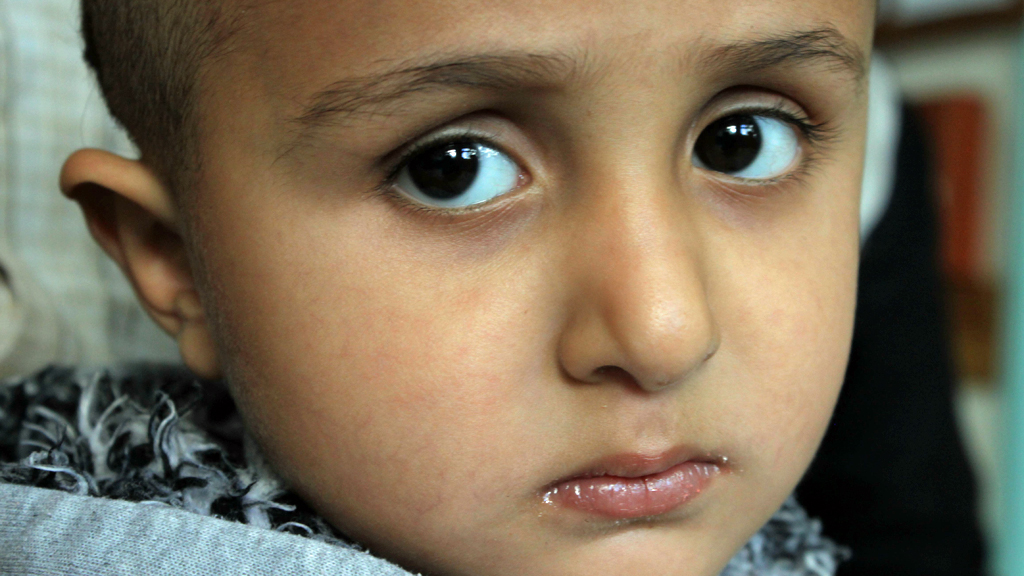Abdel Karim – the boy from Gaza who never smiles
Three-year-old Abdel Karim suffered a relapse after treatment of his brain tumour was delayed by Israeli authorities, who suspect his Gaza family of involvement in clashes with Israeli forces.
I saw three-and-a-half year-old Abdel Karim al-Dalo, in his grey flannel hoodie, before I knew who he was. He was wandering, alone, down a long white hospital corridor, clutching a half-nibbled felafel with both hands.
As I walked past, I gave him a big smile. But I did not get one back.
This is very unusual in Gaza, where children are always excited to see a new face. Instead, Abdel Karim stopped and just stood there, staring up at me, with deep, dark, doleful eyes. It was the saddest little face in Palestine.
A long wound, stretched from the top of his forehead to the crown of his head, blue stitches tied off in a knot at the top. Abdel Karim’s skull had been cleft open – and very recently.
“It’s a brain tumour,” said Dr Mohammed Abu Shaban, director of paediatric oncology, when I enquired about the little boy I’d seen in the corridor. “He had surgery one month ago. It was his third operation. He suffered a relapse because of a delay in his treatment. This is a very serious case.”
And what, I asked, was the cause of this delay, if the case was so urgent? Abdel Karim’s mother, Ghada, was, it turned out, refused permission to accompany her son to a hospital in Jerusalem. They’d had to re-apply for his grandmother to travel instead. It had been a lengthy process.
“During the delay, Abdel Karim’s condition deteriorated,” his father, Arafat, told me. “Instead of the transfer process taking 20 days it took nearly two months.” The boy’s father sighs, as the child sits quietly on his knee. His mother, sitting beside them, stares at the floor.

‘No humanity’
Arafat al-Dalo is not permitted to enter Israel because he had once been shot in the leg by an Israeli high-velocity bullet. Arafat, who is a tailor by trade, insisted categorically that he was not a militant. He had got caught up in a shooting incident at a border crossing, he said.
Ghada thinks she was refused because one of her brothers had been shot dead in a clash with Israeli forces. This made him a “shahid”, a “martyr” in Palestine; in Israel, it made Ghada a suspect.
“There is no humanity at all in the way the Israelis deal with us,” said Dr Abu Shaban. “It is dehumanising. Now,” he says, “Abdel Karim needs radiotherapy, but we do not have the facilities in Gaza.” He signed a referral form, recommending the boy’s urgent transfer to Israel, again.
Gaza does not have radiotherapy facilities because Israel prohibits the import of radioactive materials into the Gaza Strip. Israel’s control of the borders also means restrictions on other cancer medication, including chemotherapy drugs.
Doctors at Gaza City’s Dr Randisi paediatric hospital say that in recent years there have even been cases of sick children themselves having been refused permission to cross into Israel. And they cite instances of children who have died while waiting for permission to travel for treatment.

Struggling to cope
Abdel Karim’s brain tumour and the strain of caring for him have taken their toll on his family. Arafat and Ghada are clearly struggling to cope, and when we sit and talk, they’re very frank about the difficulties of their stressful lives. Ghada also became very tearful.
“It’s really challenging,” she said. “Our boy needs special care. I have a daughter who is 15 years old. She has taken on a lot of responsibility at the house, in order to share the burden. It’s very difficult at home, because we are poor.
“Most of time is taken up with my son here. His illness is much more important than our economic woes. His brothers go to school and I have no time to help them with their studies, or what they eat, what they drink, because I have to take care of this little one.”
We followed Abdel Karim and his mum and dad down to outpatients where he had a blood sample taken. The boy was stoic, but when the needle went in, it was too much for him. Ghada held on to his feet as a tear rolled down her cheek. Arafat stroked his cheek gently to sooth him. “Halas, habibi.” Enough darling. They couldn’t have been more loving.
Later, after his whimpers had subsided, I asked them whether their little son ever smiled. “He used to,” said Ghada. “But nowadays, no.”
Arafat picked up from her. “Since the last operation, I haven´t seen him smile,” he said. “He used to laugh and play. He may not be smiling, but thanks to God, he is still alive.”
Children in Gaza
In the six years between now and the end of this decade, it is predicted that half a million more children will be born in the Gaza Strip, a tiny slice of land which the UN says is “rapidly becoming uninhabitable.” It already has a densely packed, highly urbanised population.
More than half of Gaza’s 1.6-million people are children, and two thirds are refugees. The territory has the second highest proportion of under 15-year-olds in the world.
Most Gazans are now worse off than they were 20 years ago, more than a third of them live in poverty. The population explosion will place impossible strain on water and electricity supplies as well as on health and education facilities, housing and sanitation.
The territory has an extremely high fertility rate and a correspondingly high population growth rate. Gaza has one of the most youthful populations in the world.
A huge number of teenagers in Gaza will soon enter a workforce which cannot possibly accommodate them. Over the past year, the unemployment rate has jumped from 23 per cent to 43 per cent.
The impact of the seven-year-long siege of Gaza have been compounded by the closure of the tunnels into Egypt, which were an economic lifeline. Since the Egyptian authorities destroyed most of these tunnels, at least half of the 4,000-odd industrial enterprises functioning in Gaza have stopped working altogether.
People in Gaza are well-educated, with a literacy rate of 96% in 2011 (93% for women and 98% for men). Yet job prospects are pretty much zero. There is talk of a lost generation of graduates, with nowhere to go and nothing to do.
The UN report “Gaza in 2020: A liveable place?” warns of serious social consequences if things continue the way they are going. It lists “social tension, violence and extremism as possible outlets for [this] lack of meaningful prospects. This is the scenario in Gaza,” it says, “unless the political and economic situation changes substantially.